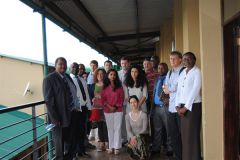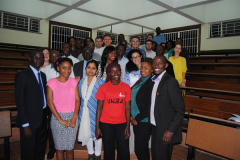16 Apr Unidev Field trip to Zambia: Theory meets practice
By Louiza Hadjivasiliou
On the 19th February, a team from Cyprus, consisting of two academics and myself, departed for Lusaka, Zambia, for a field visit which proved to be an unforgettable and unique experience on both personal and professional levels.
In Zambia, we were joined by colleagues from Ireland and Slovakia for an experience that has given us a better insight and practical understanding of the themes we deal theoretically with through our work. This was after all the pre-set goal of the field visit, organized by our project ‘UNIDEV – Bridging the gap between theory and practice’; to provide nine participants, six academics/PhD students and three NGO representatives from the three partner countries, with the opportunity to visit field projects in a sub-Saharan African country thus affording them an element of experiential learning which can help bridge, to a certain extent, the gap between theory and practice.
We experienced an intense one week programme where we had the opportunity to meet with academics and students from the public University of Zambia and the private University of Lusaka while we visited a number of local NGOs and community projects dealing with, inter alia, the issues of gender equality, education, and maternal health. We got into interesting discussions with students and academics and engaged into inspiring exchanges with NGO practitioners and field workers. Through the meetings, presentations and interaction, a number of realities and issues relevant to all four countries were revealed and all participants exchanged views on the topics of development, education, active citizenship and civic engagement.
Looking back at the overall experience, the visit proved to be unique in a number of ways, partly due to the excellent way it was organised and facilitated by the Barnabas Research and Training Institute. Not only because it allowed us to enhance theoretical learning and reinforced all the participants‘ specific areas of interest but also because, especially as a result of the long distances travelled by road, it afforded us the opportunity to experience rural and urban settings, agricultural and industrial developments, making the trip reflect true experiential learning and reducing stereotypes.
* Louiza Hadjivasiliou is the UNIDEV Project Co-ordinator. The project receives funding from the EC.




